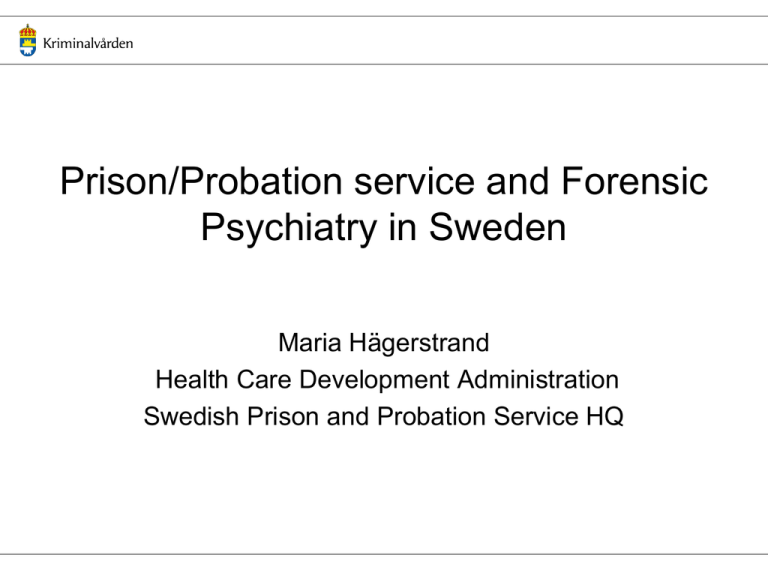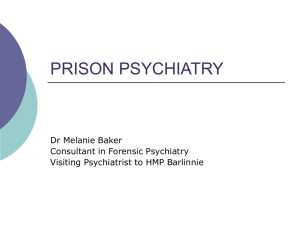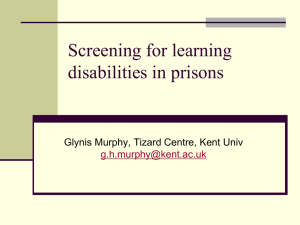Prison Probation Services and Forensic Psychiatry_SWE_Hägerstrand
advertisement

Prison/Probation service and Forensic Psychiatry in Sweden Maria Hägerstrand Health Care Development Administration Swedish Prison and Probation Service HQ Prison and Probation Service in Sweden • The Prison and Probation Service is part of the legal system. • The main tasks of the Prison and Probation Service are to implement sentences of prison and probation, to supervise conditionally released persons, to implement instructions for community service, and to carry out pre-sentence investigations in criminal cases. The organisation of the Swedish Prison- and Probation Service Ministry of Justice National Parole Board Transport Service Head Office 30 Probation Enforcement Board Northern region Stockholm region Central region Eastern region Western region Southern region 9 Prisons 5 Remand prisons 10 Prisons 2 Remand prisons 9 Prisons 5 Remand prisons 9 Prisons 6 Remand prisons 12 Prisons 5 Remand prisons 7 Probation authorities 3 Probation auth. 6 Probation auth. 7 Probation auth. 7 Probation auth. 8 Prisons 5 Remand prisons 6 Probation auth. The Health Care system in the Swedish Prison- and Probation Service Health Care Developer Committee for Correctional Medicin Regional Manager for the Northern region Health Care Coordinator Regional Nurses Consultant physicians Nurses Consultant Manager for the Stockholm region Health Care Coordinator physicians. General Director Senior Medical Advisor Regional Manager for the Central region Health Care Coordinator Nurses Consultant physicians. Regional Manager for the Regional Manager for the Regional Manager for the Eastern region Health Care Coordinator Western region Health Care Coordinator Southern region Health Care Coordinator Nurses Consultant physicians Nurses Consultant physicians Nurses Consultant physicians The clients - in prison During their time in prison, it is the responsibility of the Prison and Probation Service to prepare the inmate for a better life in freedom afterwards, through training, work and various programmes. Most clients are men. Just over half of those who are sent to prison have been in prison before. A very high percentage of the clients suffer from mental illness and severe drug problems. According to recent drugstatistic 40 of 100 inmates are under treatment with antidepressiv drugs. About 70% suffer from personality disorder and 25% from ADHD. Over half of them have experience of injecting narcotics. Many have no homes and poor finances. Inmates are people of all ages. The Prison system • 5099 beds of which 261 are for women • 10-11.000 new enrolled every year of which >700 are women • 19% of the newly enrolled are <25 years • 60% are judged to sentences under 6 months • Just under 50% have earlier judgements to prison MEDICAL SERVICES AND MENTAL HEALTH CARE IN PRISON • The Right to medical services for inmates are regulated by law. • An inmate has the same right to medical service as other persons living in Sweden (The normalization principle) • For practical reasons and due to security medical care is available in all prisons and remand prisons in Sweden. This service is provided by nurses (on duty during normal working hours and in some remand prisons there is a nurse on duty also at weekends and on public holidays) and consulting physicians (general medicine). • Some facilities also have access to psychiatrists and about one third of the nurses have psychiatric training. Prison and mental illness • All offenders, even if psychotic or mentally retarded, are legally responsible for there actions. Since 1965 Sweden do not deal with the concept of accountability/responsibility. • If an offender at the time of the crime suffers from a “severe mental disorder” the court cannot sentence him/her to prison • If the offender is still suffering from a “severe mental disorder” and is in need of psychiatric care at the time of the trial he/she can be sentenced to in-patient forensic psychiatric care. • The definition of “severe mental disorder” is legal and not a medical term. It includes psychotic disorders, severe depressive disorders with risk of suicide, and in some cases severe personality disorders, but not mental retardation. Persons with severe autistic disorders have also been excluded from criminal liability Psychiatric service in prison vs Forensic Psychiatry • The psychiatrists who consults are mostly specialists in general psychiatry and not forensic psychiatry. Their ordinary service are in General psychiatric clinics or Addiction Centers • There is no formal cooperation between The Prison and Probation Service and The National Board of Forensic Medicine or the forensic care in the different counties • There are no prison hospitals in Sweden. If an inmate needs inpatient treatment, he/she is referred to the Psychiatric Emergency Unit at the nearest Hospital. Committee for Correctional Medicine • The Swedish Prison and Probation Service has had a Committee for Prison Medicine since 1981. • The reason for the establishment of this committee was the unexplainable differences in the prescription of the medications used as drugs (benzodiazepines, opiates). • Since 1983 the Committee has published Essential medicines in the Prison and Probation Service; a booklet with recommendations for medication for the most common symptoms and diseases in the prison population. • The latest edition is named Correction medicine – manual and essential medicines, and is completed with care programs for some of the most common psychiatric disorders Health screening • There is a health screening program for inmates in remand prisons. This is carried out by nurses. • This screening program is for both mental and somatic problems. • The security staff in Swedish remand prisons are trained to recognize deviant behavior and contact the health services. • Many of The security staff are specially trained to recognize suicidal behavior. The risk of parasuicide or suicide is highest in the remand prisons. Screening for suicide risks • All persons arriving at a remand prison are asked about risk factors for suicide and if they have present suicide thoughts (so called suicide screening) by the correctional staff according to a special questionnaire • If they give positive answers they also should be investigated by the medical staff (all nurses are trained in suicidology). In anticipation of such they can be monitored either constant or intermittent. • Some cases are transported to a Psychiatric Emergency Unit for investigation Psychiatric treatment in prison • Inmates that needs out-patient treatment can have that treatment in prison. • The quality of psychiatric care in a prison is likely to meet the general mental health standards. • Most of the consulting psychiatrists are very experienced with inmates and are well equipped to handle their problems. • Almost all medication is administered under supervision; the treatment in prisons is in that way followed much more closely than outside. • Compulsory treatment is not possible Cooperation projects toghether with the Counties • Common out-patient treatment (Forensic out-patient clinic in Stockholm, Järntorgsmottagningen i Gothenburg and an out-patient clinic in Malmoe) • Screening for Adhd in Norrtälje and Storboda • ITOK (Integrated team for opiateaddicts in Kriminalvården) and similar program in Malmoe • ITOK-NPF (Integreted team for treatment of inmates with neuropsychiatric disorders • Seperate wards for adjustment of maintenance treatment for opiatedependence (Fosie, Högsbo, Storboda and Täby) New laws for compulsary psychiatric treatment • Accountability/responsibility imposed as a condition for legal action • Persons with severe mental illness will be sentenced to prison, but must start their enforcement in hospital • Former forensic psychiatric clinics will be clinics with certain agreement with the prison system • Persons with dementia and mental retardation will execute their sentence at separate wards suited to their needs • Inmates with severe mental illness, could after the sentence, if there is a risk for relapse, be forced by court to live in sheltered accommodations Forensic psychiatry in the future • Expanded investigation activities (accountability, severe mental illness, dementia/retardation • No certain clinics, but clinics with agreement with The Prison system • Need for the competence for both follow-up and assessment of recurrence-risk • Establishment of out-patient clinics where inmates with mental illness can be refered Responsibility of Forensic psychiatry (Optimistic) Prevention Prison- In-patient Out-patient Cuntinued support services care care support Present Future






